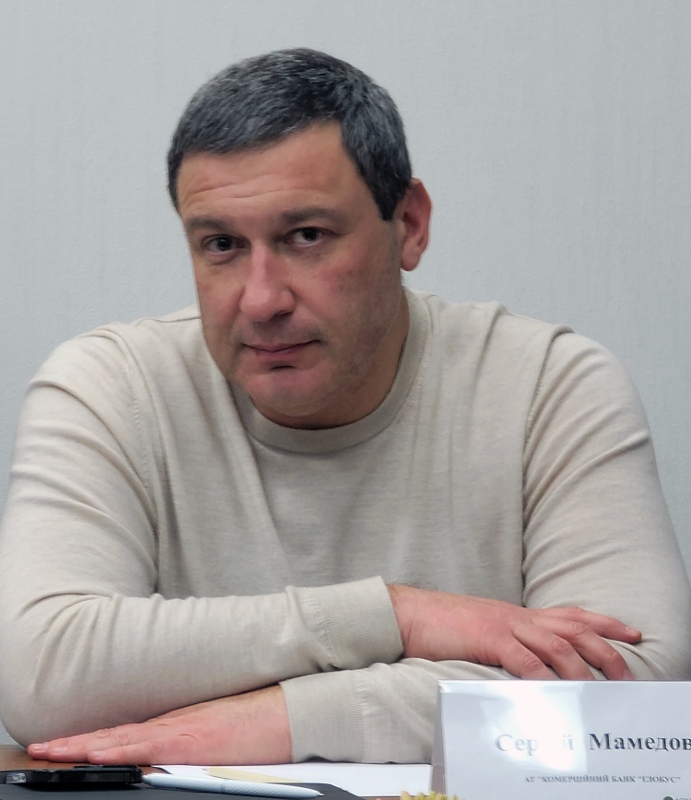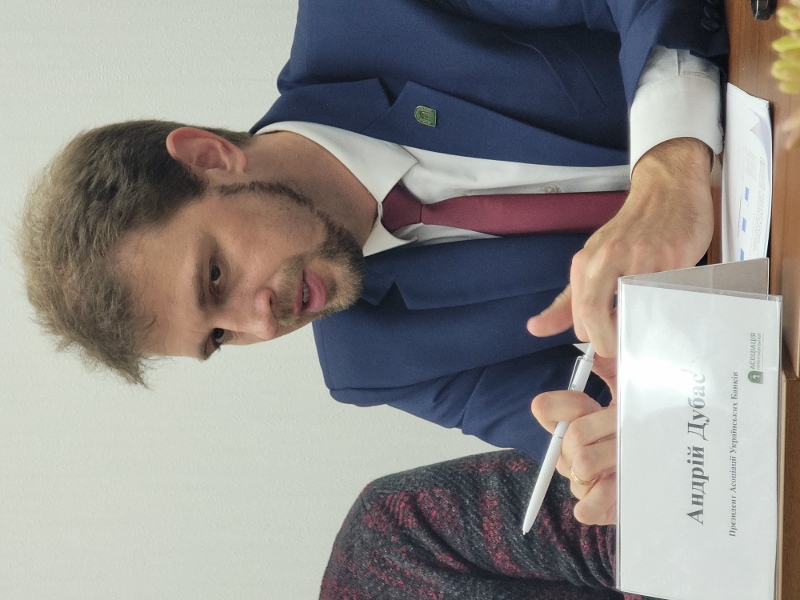AUB News
Cautious optimism: bankers and experts expect further cuts in the key policy rate, but do not predict a credit boom
On December 6, the Association of Ukrainian Banks hosted a discussion panel titled “Expectations of the Monetary Committee's decision and their impact on the banking system”. The participants of the event noted the NBU's effective monetary policy work during the year aimed at supporting the economy in the face of war and predicted a slight reduction in the key policy rate. However, in their opinion, additional measures are needed to boost lending, including the widespread introduction of war risk insurance, expansion of government compensation loan programs, a more significant reduction in the key policy rate, and deregulation of the banking system.
BANKING STRATEGY 2024: BUSINESS LENDING
A sharp decline in the discount rate may affect the attractiveness of deposits and cause an outflow of liquidity from the banking system, as customers will prefer to buy foreign currency instead of placing funds on deposits. This was stated by Serhiy Mamedov, Chairman of the Board of Globus Bank, in his speech.
“There may be a decrease in the discount rate, but it will be insignificant. I think this will be a step by the NBU to show the dynamics and consistency of the policy to reduce the key policy rate. Therefore, I believe that the reduction will be by 1%, i.e. up to 15%,” Mamedov said.
According to him, the NBU is now very cautious about short-term liquidity management instruments, such as 3-month certificates.
“With the discount rate cut, the yield on these certificates remained at the same level. What does this mean? It means that there are fears about how the client will behave, and I will behave, with regard to deposit interest rates and the amounts that may go to the market, and maybe later to the foreign exchange market, and will affect the exchange rate,” the banker emphasized.

Mr. Mamedov also spoke about how Globus Bank operates under the managed exchange rate flexibility introduced by the NBU and noted that the NBU will encourage banks to invest in government bonds rather than deposits.
“Now the NBU is changing its approach and the auctions that used to be held every Friday are now held every two weeks. For example, if we take our bank, the amount of investments in certificates is more than 3 months. Since December 1, it has been reduced by about 600 million. This is a significant amount. Thus, we see that the NBU is suggesting that we should invest in other instruments. If we are talking about liquidity management instruments, these are bonds of the Ministry of Finance. Therefore, I think that the main question now will be how to transfer the amount that the NBU currently holds in three-month certificates of deposit to the bond portfolio,” the banker shared his expectations.
He also noted that the deposit market has seen a decline in interest rates, but not as sharp as expected, which indicates healthy competition between banks and the fight for customers. As for the revival of lending, Mr. Mamedov said that banks have become more active in this area.
“Banks have started to pay more attention to lending. We see that government programs to support business are being launched. Now we are expecting changes to the 5-7-9 lending program. All government programs are a signal to the banking system where to go and what to pay attention to. And not only in terms of lending areas, but also in terms of the fact that the risk under these programs is lower for banks. It is very important for the client to service the debt under these programs, and if they do, they get a lower interest rate. After all, servicing debt with a rate of 20% and above is much more difficult than with a rate of 7 or 9 percent,” the banker said.
The Chairman of the Board of Globus Bank also drew attention to the fact that regional authorities are joining loan compensation programs, enabling local businesses to develop.
“If we take the 5-7-9 program, there is a tendency for local authorities to sign agreements on compensation in a particular interest rate region. For example, it is Lviv, Kyiv, Kyiv region, Lviv region. And the compensation is paid up to a rate close to zero. That is, if the client is included in the list of possible companies in terms of the program requirements, he can currently receive financing at almost zero percent,” the banker said.
In 2024, Mamedov believes that the NBU should expect further gradual reduction of the key policy rate and encourage banks to actively lend to the real economy. At the same time, he noted that in order to intensify lending, it is necessary to introduce tools to close military risks for banks.
“At a recent meeting, NBU Governor Andriy Pyshny said that lending would be a priority for the next year. However, I would like to point out that lending can only be intensified if interest rates are different. Therefore, the main task is to allocate money for lending. Banks are analyzing, looking at, and developing products. We realize that we are working in a difficult period - the war is ongoing. That is why the risks we face today are very high in terms of business. There is currently no instrument for banks to cover military risks. Today, all risks are borne by the banking institution,” said Mr. Mamedov.
At the same time, the banker noted that banks should lend, as this is their direct function. Globus Bank has been gradually resuming lending since the beginning of last year, both to individuals and legal entities.
“We believe that there is a need to provide customers with financing. If we do not lend, customers will go to other financial institutions that have an offer. I repeat, the trend of growth in the loan portfolio of banks will continue to grow next year, unless there are any sharp negative developments. That is why, in my opinion, the strategy of each bank now is to intensify lending for the next year,” summarized Mr. Mamedov.
RISK SHARING WILL REVIVE LENDING
Market structures have successfully adapted to the new currency regime. Of course, it would be most appropriate to ask market participants directly, but the general impression is that the system has already effectively coped with this task. The multiplicity of exchange rates is gradually disappearing, and the cash exchange rate is aligned with the non-cash exchange rate, with no significant fluctuations. This opinion was expressed by financial expert Yevhen Dubohryz during the discussion. According to his forecast, we should expect a 1% reduction in the key policy rate.

“It seems to me that the expectations of all of us are exactly the same. The National Bank will spend, in principle, as much as it spent on interventions to support the hryvnia exchange rate. I expect minus one percent. Over the past year, since Andriy Pyshny became the head of the NBU, the regulator has been very predictable in terms of the key policy rate. On the other hand, the NBU is completely unpredictable in terms of changes to its operational design. With each new meeting of the monetary committee, something new appears in the operational design. I think it is too expensive for banks to constantly change their system, to constantly adapt. Constant changes in the operational design, I think, could be more predictable,” Dubohryz said.
The expert noted that the NBU should develop a strategy to intensify lending together with banks, engage the banking community in discussion and debate.
“In numerous interviews and columns, the NBU's top management writes that lending is now a priority for the NBU. Through the media, the NBU encourages banks to provide more loans.
But there is almost no response to address the issue of risks. Even before the full-scale invasion, lending was not growing very much. And the fact that net loans have increased by 5% since July - let's be honest, this is still at the level of statistical error,” Dubohryz said.
In his opinion, the NBU should reduce certain regulations in its policy to restore lending.
“Unnecessary regulations should be eased, those that restrict business access to capital. For example, NBU Resolution No. 351 contains 29 documents that are required for a borrower to apply for a loan. Large enterprises can afford it, while small businesses, to put it mildly, cannot always,” Dubohryz said.
He added that the NBU sometimes perceives the attempts of banks, industry associations, and individual market players to change regulations from a risky point of view
“They say you want to return to 2012, when you lent to everyone indiscriminately. But this is not true. Because all these regulations, the regulation of credit, operational, market risks - it is relevant, time changes, circumstances change. Some things that were relevant in 2016 have now lost their relevance, and we need to work on them. That is, we should not relax risk requirements. There is no need to increase requirements for borrowers. We need to conduct an audit and understand which conditions no longer work. For example, the conditions for financial indicators. Because no previous good financial performance of a company guarantees that it will continue to be profitable in the future and will be able to pay off its debts, and vice versa. These things should not be taken into account either. The NBU can do this. At least to simplify access to credit for businesses, to simplify these transaction costs for businesses, especially for small ones, when applying for loans,” Dubohryz said.
The financial expert also emphasized that the NBU should present the concept of insuring military and political risks.
“It is important to separate one from the other - military risks and political risks. Military risks are, for example, losses from the destruction of property as a result of hostilities. Political risks are that some allure enforcement officer will come, i.e. some prosecutor, and the business will work worse after that. Or that there will be some kind of expropriation, nationalization. If these things are separated, if the regulations are clear: who insures military risks and how, who insures political risks, then I think this can improve the situation. The regulator can also make more use of risk-sharing mechanisms. When the risk is not assigned to the bank specifically, but is distributed among partners, it can be either the supplier or the seller, it can be international financial organizations. It can be some other banks from other countries, other groups of banks. We have virtually no syndicated lending,” Mr. Dubohryz said.
He emphasized that today the main obstacle to the active resumption of lending is that the existing risks are large, unpredictable, and not calculated.
“The only way is to distribute risks. That is, on the one hand, there is the 5-7-9 program, and the government guarantee program. There are many programs offered by the European Bank for Reconstruction and Development, the American Corporation for International Development (DFC), and the International Finance Corporation (IFC). Within these programs, there is a mechanism of guarantees ranging from 10% to 90% for state programs and up to 80% for international programs. If you combine these things, as some banks do, lending soars. These guarantees, which are given for five years, are used in six months, and banks still need such instruments. These are very attractive instruments,” the financial expert emphasized.
FEWER GRANTS - MORE LOANS

In his speech, Nikita Mishakov, Head of Interbank Operations at PrivatBank, agreed with his colleagues' opinion on the 1% cut in the key policy rate, but noted that a sharp reduction in the rate could have a negative impact on the banking system.
“The regulator's policy is clear: to intensify lending, which is impossible with a high discount rate. It is good that the NBU is not doing this abruptly. In general, the regulator's prudent monetary policy has reduced the outflow of money to the foreign exchange market, which has led to an appreciation of the hryvnia. I hope that this time the key policy rate will also be reduced by one percent, as predicted by my colleagues, and the decision of the Monetary Committee will not be a shock. PrivatBank, as the largest state-owned bank, has a social responsibility. We are trying to lend a shoulder to our regulator in matters of exchange rate stability,” Myshakov said.
He noted that PrivatBank is currently trying to maximize lending to both individuals and legal entities.
“We have a large network and we want to lend as much as possible to individuals, individual entrepreneurs, small businesses, and medium-sized businesses. We are a bit short of reliable partners among medium and large businesses. We weigh all the risks that exist. We cooperate with the EBRD. We plan to launch a program with DFC. As I have already said, these are very good instruments that provide support to the bank. Perhaps, the main problem in lending for us is the lack of reliable business partners who would like to cooperate and would be ready to cooperate on the terms provided by the state. We also work with all government programs. But the situation is such that most of our loan portfolio is focused on lending to individuals, small businesses, small enterprises, and individual entrepreneurs. We load them with loans to the maximum. At the same time, we are now actively trying to expand our presence in medium-sized corporate business. Gradually, we are getting clients who realize that PrivatBank is not only about salary card projects. They realize that they can cooperate with us on long-term business lending,” said the PrivatBank representative.
Mykyta Myshakov also shared his reservations about the reduction of funding for Ukraine from international partners, which could significantly affect the country's economy.
“Expectations for the next year are not so much about the Ukrainian banking system, where the situation is more stable, but about the overall situation on the international level. I don't think that next year will see a sharp decline in funding from foreign partners. But perhaps a part of this funding will not be free grants, but will become loans. This, of course, will put an additional burden on Ukraine's budget expenditures. That is, this river of funding will not be blocked, but it will become a little narrower. We have to adapt to this. I don't see anything critical in this, but we need to be prepared. We have managed to stabilize the situation, and there is a safety margin in the financial sector. Of course, it would be better to have macro-financial support grants that cover all the issues of the state budget. But we will probably have to pay a higher price and optimize if grants are replaced by loans. The United States and the European Union are calling for the implementation of reforms that relate, among other things, to the efficiency of the use of the funds that we receive,” Mishakov said.
The representative of PrivatBank also emphasized that the NBU's prudent actions this year have stabilized the hryvnia exchange rate, but even the regulator did not expect such a strengthening of the hryvnia at the end of the year.
“To be honest, perhaps the NBU itself did not expect such a level of hryvnia strengthening. The high season among farmers also contributed to this. That is why the government and banks are now trying to encourage farmers to bring their foreign currency earnings to Ukraine and sell them for hryvnia. An important step in the fight for the exchange rate was the introduction of flexibility. Of course, exporters were hoping that this flexibility would lead to the official exchange rate being closer to the real hryvnia exchange rate that we saw in the gray and black currency markets. But by that time, the gap between the cash dollar and the interbank exchange rate had already been more or less adjusted. At the same time, market participants expected a smooth devaluation, albeit to the level at which the NBU had been intervening for more than a year. This is about UAH 39 per US dollar. This is what exporters were demanding. But the market reacted differently, apparently something happened beyond the expectations of the regulator itself,” Myshakov said.
UAH ASSETS SHOULD REMAIN ATTRACTIVE

Maksym Dumansky, a representative of the Bank for Investments and Savings, said that there will be no sharp change in the key policy rate, as the NBU needs to address the attractiveness of hryvnia assets to offset their outflow to the foreign exchange market.
“At the next meeting of the National Bank on monetary policy, we will get a small reduction in the key policy rate - up to the level of fifteen percent per annum or less. The NBU needs to direct banks to lend to the real sector of the economy. But for this purpose, it is necessary to reduce the key policy rate because its high level does not allow banks to increase lending. However, on the other hand, the NBU needs to address the issue of the attractiveness of hryvnia assets for new assets, such as deposit savings or government bonds. Therefore. In this regard, we do not expect a sharp change in the key policy rate. However, it is possible that hryvnia assets will become attractive, and this will affect the foreign exchange market. We expect the NBU to maintain its operational design as it is,” Dumansky said.
According to the representative of the Bank for Investments and Savings, the regulator's raising of the discount rate at the beginning of the war with the introduction of the NBU's deposit certificates and government bonds helped banks that had suffered a significant reduction in liquidity due to the hostilities to repay their debts and become profitable.
“We, like most banks, suffered a significant reduction in liquidity as our clients, expecting a significant exchange rate jump, began to flush their liquidity into commodities. We, like other banks, needed to raise loans from the NBU in early 2022. And after the sharp change in the discount rate, it really had a negative impact on the bank's performance. But we repaid the NBU loans by returning liquidity. This allowed the bank to level off and continue to make a profit,” said Dumansky.
He also noted that the NBU's currency easing will have a positive impact on reducing the multiplicity of exchange rates.
“As you know, on December 1, the NBU eased currency regulation requirements and allowed banks to sell cash foreign currency without taking into account the positive balance. This will also have a positive impact on reducing the multiplicity of exchange rates and bringing the cash exchange rate closer to the non-cash exchange rate,” Dumansky said.
DEREGULATION WILL INCREASE THE EFFICIENCY OF BANKS

Summarizing the third discussion panel this year, Andriy Dubas, President of the Association of Ukrainian Banks, noted that although there are different opinions on the regulator's operational design, experts have reached a consensus that the key policy rate should be reduced, but without sharp jumps.
“This is probably the first time we have reached a consensus. The unanimous expectation from our panelists today is that the next key policy rate decision will be minus 1%. So we expect the NBU to cut the key policy rate from 16% to 15%. There are different opinions about changing the operational design. Experts also expressed their views on the active resumption of lending to the real economy. The main thing is that banks are ready to lend, but the issue of military and political risks is not closed today. Also, the issue of the client's readiness to submit the necessary documents and financial statements remains open, as the bank needs to assess all risks, including the client's solvency and profitability of its business,” said Andriy Dubas.
The UBA President also emphasized that an important part of the discussion panel was the discussion of the deregulation process in the banking system, which in turn will have a positive impact on the resumption of business lending.
“It was nice to hear from the panelists today that it is worth initiating the issue of revising certain regulatory requirements with the regulator. Not the risky requirements of the NBU's 351st resolution to make it easier to lend, but the requirements that today already meet the dynamics of modern financial and economic processes or, due to martial law, may simply be irrelevant and constitute a brake on banking activities. After all, they additionally burden both the entrepreneur, who needs to submit certain documents, and the bank, which then processes, verifies, and checks these documents, spending time,” summarized Andriy Dubas.
Subscribe to our newsletter

Contacts
15, Yevhena Sverstyuka str.,
Kyiv, 02002 Ukraine
Email :
office@aub.org.ua
Phones:
+380 (44) 516-8775
